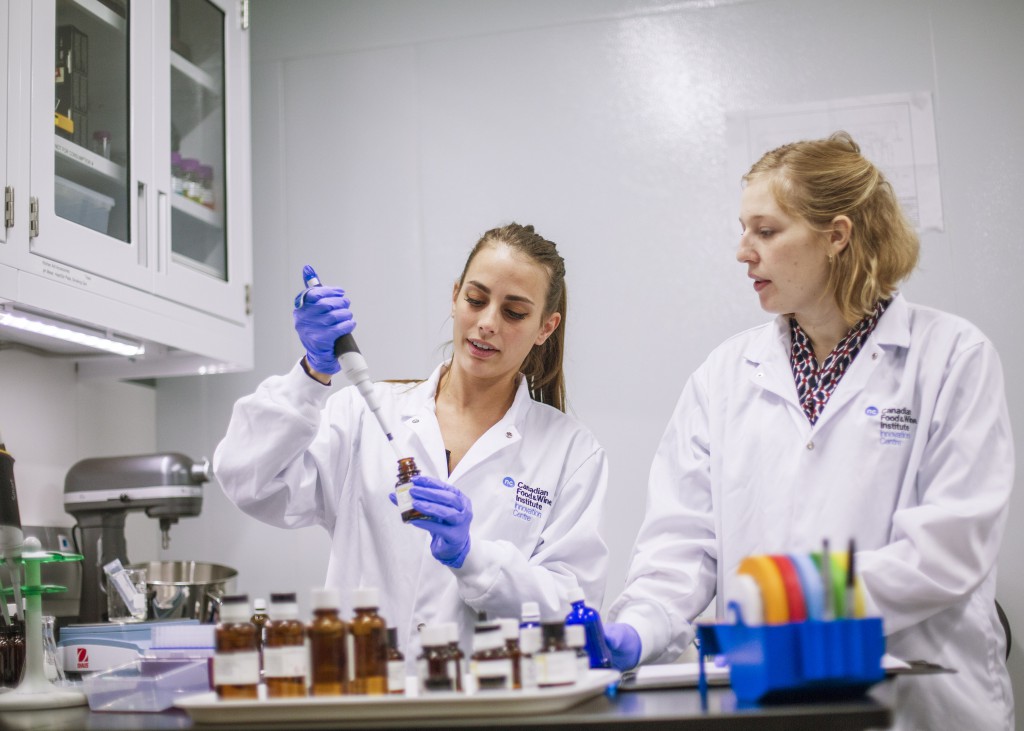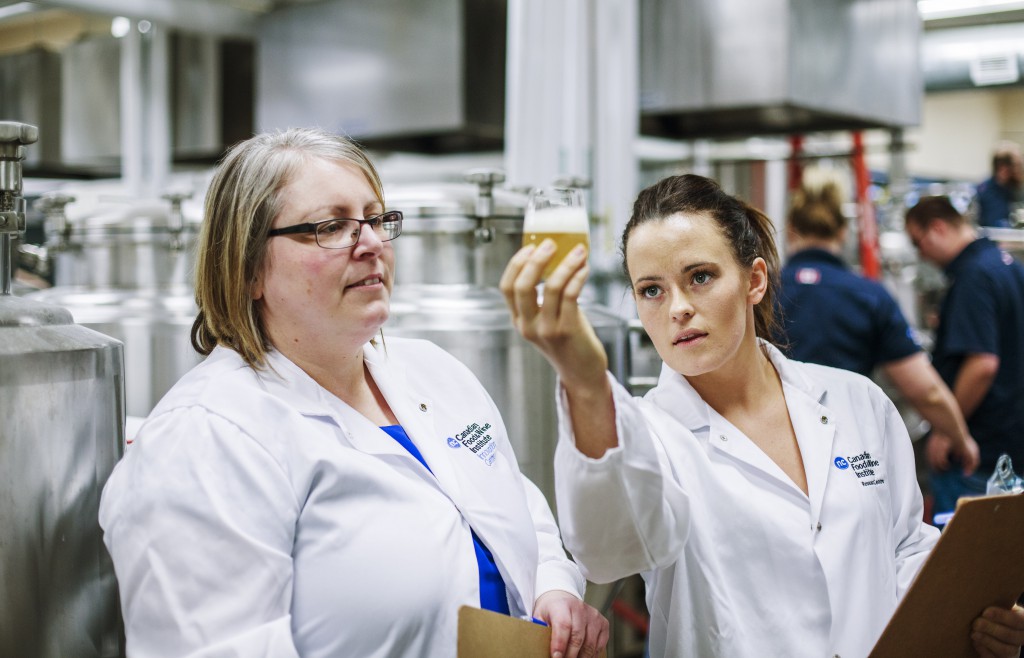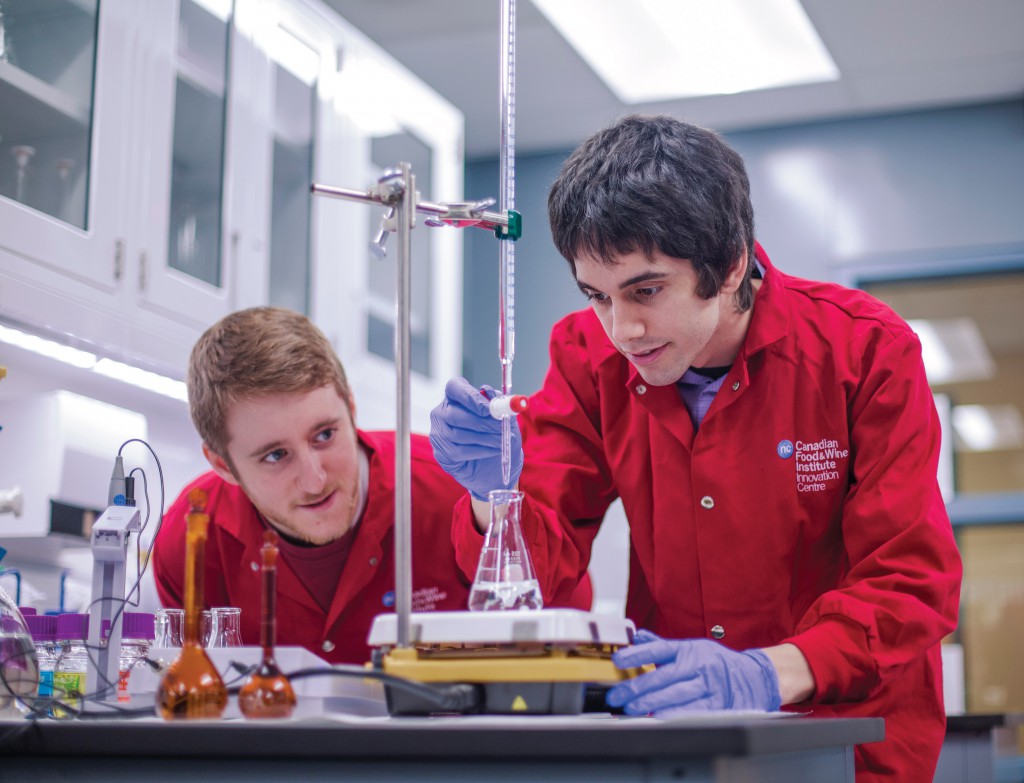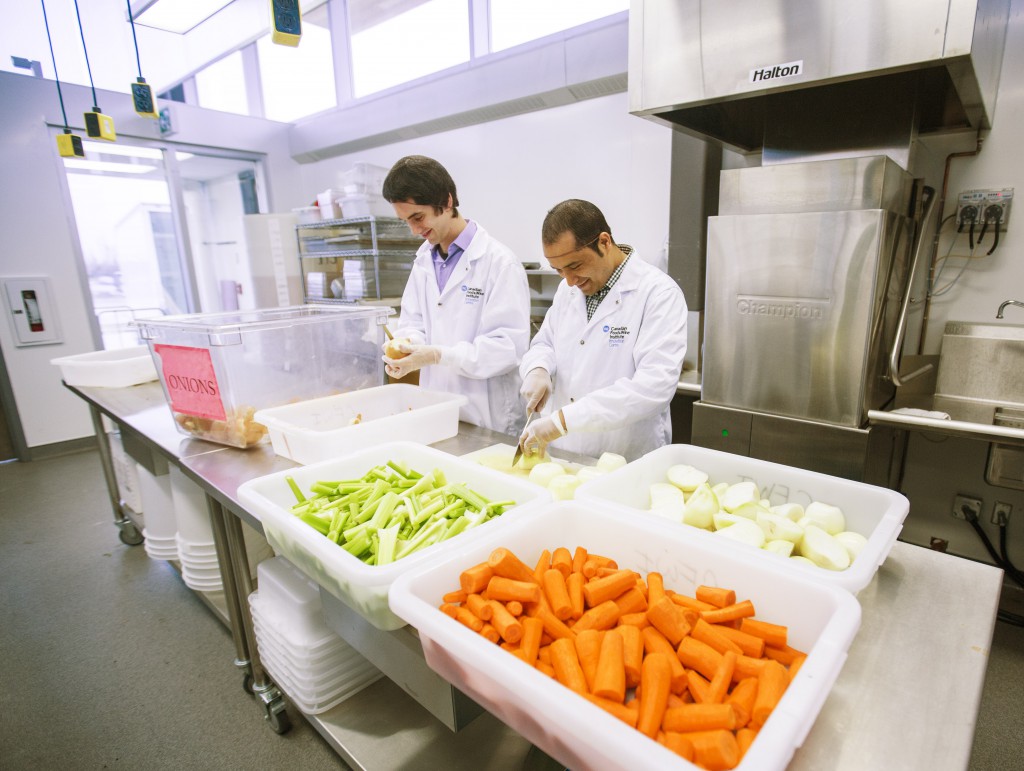Nestled in the heart of Niagara’s rich wine and culinary country, at Niagara College’s Niagara-on-the-Lake Campus, the Canadian Food and Wine Institute (CFWI) provides students with valuable hands-on experience and academics in all aspects of food, wine, beer and artisan distilling.
Five years ago, the College’s Research & Innovation division was given an unprecedented opportunity to transform the food and beverage industry in Canada with more than $4 million in federal, provincial and industry funding, to establish what is now the CFWI Innovation Centre at the NOTL campus. The announcement was made during a visit by Her Royal Highness, the Countess of Wessex.
Today, the Innovation Centre team offers a full suite of services to support industry innovation and commercialization of new products and processes in the food and beverage sector. From new recipe development to shelf-life testing and nutritional labelling, the CFWI Innovation Centre pairs industry partners with faculty, recent graduates and students with the right expertise and equipment to meet industry needs.
The Centre leverages the resources of the College’s commercial brewery and hop yard, commercial winery and vineyard, and commercial kitchens, while also operating a microbiology lab, chemistry lab, sensory and consumer testing labs, shelf-life and packaging lab, and related commercialization solutions to allow industry partners to be market ready.
To learn more about the CFWI Innovation Centre’s significant work, impact and funding, we spoke with Lyndon Ashton, the Innovation Centre Manager, about a few specific topics below:
A Technology Access Centre
 The CFWI Innovation Centre is realizing its expanded role in helping local food and beverage innovators after a $1.75 million federal government grant announced in the fall of 2016 to create a Technology Access Centre (TAC). The five-year funding allows the Innovation Centre to ramp up its expert staffing – this has included the hiring of a centre manager, senior food scientist and a dedicated lab technologist – while increasing technical services in such areas as food safety plans, chemical testing, microbiological assays and content analysis.
The CFWI Innovation Centre is realizing its expanded role in helping local food and beverage innovators after a $1.75 million federal government grant announced in the fall of 2016 to create a Technology Access Centre (TAC). The five-year funding allows the Innovation Centre to ramp up its expert staffing – this has included the hiring of a centre manager, senior food scientist and a dedicated lab technologist – while increasing technical services in such areas as food safety plans, chemical testing, microbiological assays and content analysis.
TACs are specialized applied R&D centres affiliated with Canadian colleges or Cégeps. Demand-driven TACs help Canadian businesses – especially SMEs – advance their products, processes and services by: conducting applied research and development projects focused on company problems; offering specialized technical services and objective advice and providing training related to new types of equipment and processes.
“Of significant value to our industry partners, is that we are part of a national network of 30 TACs across Canada, supported by the Tech-Access Canada network,” explains Lyndon Ashton, Centre Manager at the CFWI Innovation Centre. There are others in food and beverage, agriculture, manufacturing, digital media, aerospace, etc.; the value of this, says Ashton, is having a collective body of knowledge to share and tap into, which in turn assists with solutions and ideas for industry partners.
“As well as serving industry, we are also dedicated to offering students and recent graduates participation in these projects and technology applications, making them employment-ready once they are ready to enter the working world,” notes Marc Nantel, Associate Vice-President of Research & Innovation at Niagara College, and also a board member of Tech-Access Canada.
This is the second TAC for the College (and one of only a handful of institutions with two TACs); the first being awarded in 2014 to the Walker Advanced Manufacturing Innovation Centre at the Welland campus, to allow for its expansion of services and equipment.
Helping Food and Beverage Businesses Grow
Food and beverage companies are able to access world-class culinary and food science expertise, facilities and equipment at the CFWI Innovation Centre. This unique partnership offers a significant competitive advantage to small- and medium-sized businesses in the food and beverage sector.
 This creative and innovative collaboration is highlighted in the recent research partnership with Reinhart Foods Ltd., a family business with more than 100 years of experience in delivering quality food products and service to North American markets. Looking to expand their business and manufacture a unique hard cider beverage for the Ontario market and beyond, Reinhart looked to the College’s CFWI Innovation Centre for their experience and facilities to develop a world-class apple cider beverage.
This creative and innovative collaboration is highlighted in the recent research partnership with Reinhart Foods Ltd., a family business with more than 100 years of experience in delivering quality food products and service to North American markets. Looking to expand their business and manufacture a unique hard cider beverage for the Ontario market and beyond, Reinhart looked to the College’s CFWI Innovation Centre for their experience and facilities to develop a world-class apple cider beverage.
The CFWI research team developed a unique hard cider product using 100 percent Ontario-grown apples. Reinhart launched the new beverage in May 2017 into LCBO stores, with the potential to also export within Canada and the United States.
“In a real way, we are a portal to industry solutions that not only offers R&D supports, but connectivity to the next generation of talent in wine, beer, sensory, product development, and food safety and science,” says Ashton. “Companies have access to our experts, faculty, and students, who are often working with the most current equipment and facilities, and in turn, the industry partners retain all of the intellectual property developed in our projects.”
Contributing to the Local Economy
A great example of how the CFWI Innovation Centre contributes to the local economy was the partnership with Community Living, which operates a social enterprise whereby their clients (persons with developmental disabilities) are provided employment in their commercial kitchen. They wanted to expand their ‘Well Preserved’ line of hand-crafted condiments and jellies with a new product line, incorporating ingredients from local partners. Although they had their own kitchen, they lacked the necessary food science skills and regulatory expertise.
The research team at the Centre created and tested several recipes, keeping in mind the need for straightforward recipe instructions. In the end, four new recipes were chosen: an Asian-inspired barbecue sauce, a pepper peach salsa, a Mexican salsa and a pear brandy plum barbecue sauce. The research team then created Nutrition Facts Tables (NFTs) that met Canadian Food Inspection Agency (CFIA) regulations and provided on-site training for each of the new products.
Community Living has been producing and selling the pepper peach salsa since the summer of 2015 with great commercial success.
Student Success
 Students with applied research experience from the CFWI Innovation Centre are securing excellent jobs in industry. More recently this includes: Spencer Dion, who is now quality assurance coordinator with Marsan Foods; Darcy Devereaux, who accepted a position as product development chef with Marsan Foods; Beatrix Princze Csemer, now food technologist with E.D. Smith Foods; Sarah Polkinghorne, a brewing assistant with Foamers Folly Brewing; and Jonathon Weber, an R&D technologist with Herbaland Naturals.
Students with applied research experience from the CFWI Innovation Centre are securing excellent jobs in industry. More recently this includes: Spencer Dion, who is now quality assurance coordinator with Marsan Foods; Darcy Devereaux, who accepted a position as product development chef with Marsan Foods; Beatrix Princze Csemer, now food technologist with E.D. Smith Foods; Sarah Polkinghorne, a brewing assistant with Foamers Folly Brewing; and Jonathon Weber, an R&D technologist with Herbaland Naturals.
More success stories and evidence of the impact of training on students can be found at http://www.ncinnovation.ca/newsroom/videos.
The Value in Food Innovation
The research team at the CFWI Innovation Centre possesses the expertise, the world-class facilities and equipment, and funding to take on industry-led applied research activities and technical services. Of the myriad specialties at the Innovation Centre, recipe and new product enhancement and value-added product development are particularly valuable.
The research team can: develop new products to expand existing revenue streams, improve existing products to enhance competitive positioning, enter new product categories with unique product offerings, increase product quality and ease of operations, and assist with ingredient sourcing, co-packing referrals, and packaging recommendations.
Funding Support
The funding has allowed the hiring of a senior food scientist, lab technologist, research project manager and centre manager.
“This means we can be more responsive to our clients in a timely manner with our technical services, and assemble teams faster internally to vet opportunities and find potential solutions at a pace that can meet industry demand,” explains Ashton.
“Further, it allows us to run longer-term applied R&D projects where we investigate the suitability of linking potential government funds with matching industry contributions in the areas of product development, commercialization, food safety and regulatory solutions.”
Research Projects
Some of the recent projects that speak to the creative and innovative research taking place at the CFWI Innovation Centre include:
Rich Products, is the founder of the non-dairy segment of the frozen-food industry and a leading supplier for the foodservice, in-store bakery and retail marketplaces. Rich’s approached the CFWI Innovation Centre for an inventive approach to cake and pastry decorating for a new product line. The research team of culinary students, graduates and professors spent an intensive day trouble-shooting hundreds of ideas; in the end they provided more than 30 innovative prototypes.
Daneson, a gourmet-flavoured toothpick company that has grown to become a status symbol with a growing list of celebrities using their products, had identified the need to create an all-natural Halal flavour profile. Along with creating this new flavour profile, the College research team created new methodologies to extend shelf-life which are being incorporated into the manufacturing process flow.
Gabriella’s Kitchen, which produces gluten and GMO-free pastas, without additives and preservatives, wanted to expand their frozen entrée product offering. The Innovation Centre team created three entrées and also provided Canadian/US Nutrition Facts Tables.
On the infrastructure side, the College is in the midst of an exciting development in the form of a new Agri-food and Athletics four-storey expansion to the NOTL campus, a project funded by the federal government’s Post-Secondary Institutions Strategic Investment Fund and aimed at supporting economic development in the Niagara region. For the CFWI Innovation Centre, it means 4,500 sq. ft. of additional space to expand the beverage analysis and processing and add industry incubator space.
You can visit the Canadian Food and Wine Institute Innovation Centre’s website here. Thank you to Lyndon Ashton and the CFWI for taking the time to share with us! If you would like to connect with Lyndon, you can reach him at lashton@niagaracollege.ca.

